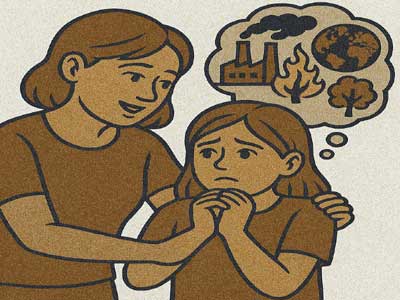Reducing the perceived psychological distance of climate change can help children use coping strategies for climate anxiety more effectively. This conclusion is based on a comparative study from the UCD Michael Smurfit Graduate Business School.
Associate Professor Geertje Schuitema and Dr Anthea Lacchia compared primary school children’s emotional responses and coping strategies for anxiety experienced as a result of climate change with anxiety experienced during the COVID-19 pandemic.
Psychological distance is a known coping strategy and refers to how far away an event psychologically is, for example, in time or space, how much control you feel over an event, or how likely an event is to happen. Data was collected on children's emotions through surveys and sketches.
The results suggest that because climate change is perceived as more psychologically distant than COVID-19, it is more difficult for children to use coping strategies to deal with climate anxiety. Reducing the psychological distance of climate change would likely improve children’s climate anxiety by enabling them to effectively use four coping strategies.
First, emotion-focused strategies rely on de-emphasising and re-framing the issue to remove or reduce the stressor that leads to negative emotions. Second, problem-focused strategies shift the focus away from the issue itself to solutions for the issue. Third, meaning-focused strategies aim to regulate emotions by activating positive emotions, such as hope and trust in others, while fourth, relationship-focused strategies rely on social support to regulate emotions.
Relationship-focused strategies were particularly important for children in coping with COVID-19 anxiety. This suggests positive social support, acknowledgement, and the feeling that everyone working is together to solve climate change may help reduce children’s climate anxiety, especially when combined with the other coping strategies.
“Climate anxiety among young children is a growing concern as it negatively impacts mental well-being,” says Prof Schuitema. “For any coping strategies to be truly effective, they must include support from policymakers, industry, and others who are largely in control of climate mitigation actions.”
Although reducing the psychological distance of climate change is beneficial for children’s climate anxiety and coping strategies, prior research suggests that the opposite is true for adults. Therefore, the researchers warn that we must acknowledge that messages and strategies used to motivate adults to take climate action may increase climate anxiety in children.
















Related Items
How the winds of change reached a small shop…
When treatment becomes a profit-driven business…
Climate scientists are ignoring fast-growing cities in Africa and Asia